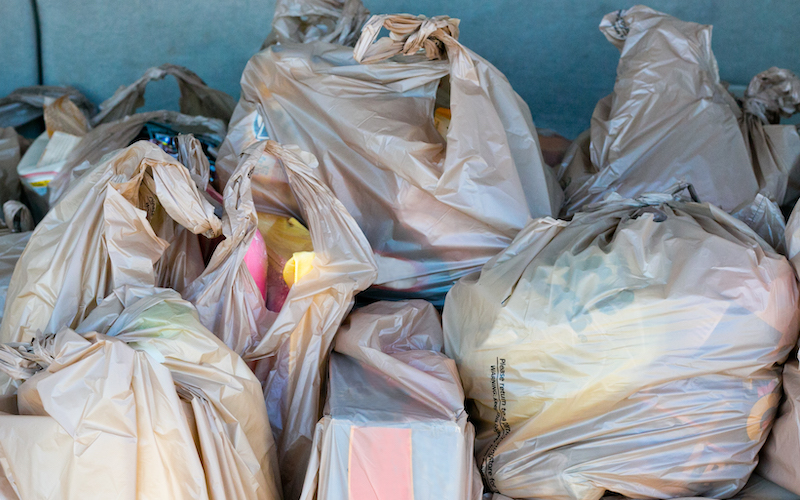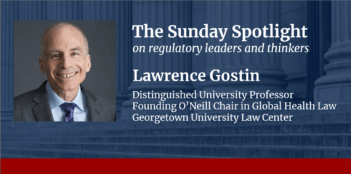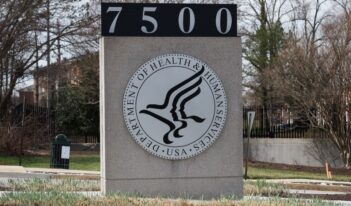
The COVID-19 pandemic tests the strength of U.S. bans on single-use plastic products.
Just a few months ago, the movement to ban single-use plastic seemed somewhat unstoppable.
By the end of 2019, nine states—California, Hawaii, New York, Connecticut, Delaware, Maine, Oregon, Vermont, and, most recently, Washington—had enacted statewide bans on single-use plastic bags. Several major cities including Seattle, San Francisco, and Washington, D.C., had banned plastic straws. And statewide bans of other single-use plastics, such as plastic utensils, Styrofoam packaging, and travel-size plastic bottles for personal care products had been proposed or enacted.
In mid-February, just a few weeks after the Chinese media reported that country’s first COVID-19 death, and several weeks before the virus became a nationwide concern in the United States, U.S. Senator Tom Udall (D-N.M.) and U.S. Representative Alan Lowenthal (D-Calif.) introduced the Break Free from Plastic Pollution Act, which would establish a nationwide phase-out of plastic carryout bags, plastic utensils, and food containers made from polystyrene.
By the end of February, though, the Centers for Disease Control and Prevention reported the first COVID-19 death in the United States. Two weeks later, the Plastics Industry Association wrote to the U.S. Department of Health and Human Services (HHS) declaring single-use plastics “the most sanitary choice when it comes to many applications, especially the consumption and transport of food, whether purchased at a restaurant or at a grocery store.” By April, states were delaying or not enforcing laws that targeted single-use plastics.
In a span of a few months, plastic bans went from hot to not. Before COVID-19, the plastic industry vigorously pushed back against statewide plastic bans. For example, in 2016, the American Recyclable Plastic Bag Alliance, which represents plastic bag manufacturers and recyclers, raised $6.1 million in an unsuccessful effort to defeat Proposition 67—California’s measure banning single-use plastic carryout bags. But now it seems as if COVID-19 has breathed new life, albeit for a different reason, into industry efforts to halt single-use plastic bans.
The health concerns of COVID-19 have eclipsed the environmental harms associated with plastic waste.
Fear of contamination from reusable grocery bags has paused the implementation and enforcement of plastic bag bans across the country. One frequently cited study conducted by scientists from the National Institute of Allergy and Infectious Disease, and published in the New England Journal of Medicine in March, detected COVID-19 on plastic surfaces 72 hours after researchers applied the virus. Since this publication, scientists at the Johns Hopkins University School of Medicine have attempted to downplay this alarming statistic by emphasizing another data point from the study: less than 0.1 percent of the starting virus material remains after 72 hours, meaning that, although infection can theoretically happen, it is unlikely to occur.
Although studies on how people become infected with the novel coronavirus are ongoing, contact transmission is one suspected mode of transmission. With contact transmission—in contrast to respiratory or aerosol transmission—individuals touch an object contaminated with the virus and then touch their nose, mouth, or eyes, where the virus can enter the body via the mucous membranes.
Even though no one knows the rate of transmission via contact with contaminated surfaces, such transmission appears to be a possibility given that the virus can remain viable on different surfaces. Contact transmission is the rationale behind reminders to wash hands, disinfect surfaces, and now leave reusable bags at home.
Despite the unlikely risk of COVID-19 infection from reusable grocery bags, governors have been receptive to requests from grocers and retailers to suspend or postpone plastic bag bans. The Plastics Industry Association’s March letter to HHS asked Secretary Alex Azar to make a “public statement on the health and safety benefits seen in single-use plastics” and to “speak out against bans on these products as a public safety risk.” The letter cited three studies in support, none of which involved COVID-19. The studies cited by the Plastics Industry Association suggest that reusable bags, if not washed, can play a role in cross-contamination of food.
Although HHS has yet to come out with a public statement against single-use plastic bag bans, at the state level, New Hampshire Governor Chris Sununu has signed an executive order “requiring all sellers of groceries to temporarily transition to the use of single use paper or plastic bags.” New York and Maine are delaying enforcement of statewide laws banning bags until later in the year. In an effort to safeguard employees and customers, grocery stores are asking customers to leave reusable bags at home and use only bags provided by the stores.
The long-term impact of COVID-19 on the movement to ban single-use plastics remains to be seen. The movement might be able to withstand the temporary suspensions of existing laws. But for now, the health and safety of individuals takes precedence over plastic bans for state officials. Many commentators predict that society will be forever changed by COVID-19, and that most likely includes a reframing of the plastics debate.




